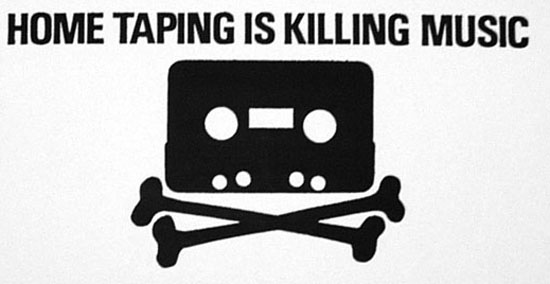This post is inspired by the MediaHacks podcast, where Hugh McGuire relayed the story/opinion that Encyclopaedia companies were up in arms over Wikipedia, by claiming that Wikipedia was going to kill the business for Britannica, etc. Hugh, rightly so, called them out on this being a load of crap. What it DOES do, however, is force Britannica to up their game and really put some thought into what their core value is (is it books? is it making people look smart to their friends by having encyclopaedia in their house? Is it as an heirloom? is it actually the information) and adjust their business model accordingly.
Media companies by and large have become complacent and lazy, believing their own hype, and (most importantly) believing that they are the only ones who can affect the market for what they’re selling and how.
This particular combination of traits, combined with a healthy disinterest and sometimes even contempt for their customer base (“look what we made them buy AGAIN”) has lead to panic and frequent legal action when the paradigm has shifted via external means. For example (and this will be the only time I pick on the music industry specifically):

Similarly, when the VCR was starting to become widely available, then head of the MPAA Jack Valenti gave this testimony before Congress ((via Mark Reeder and Slashdot))
“‘I say to you that the VCR is to the American film producer and the American public as the Boston strangler is to the woman home alone.’ Jack Valenti said this in 1982 in testimony to the House of Representatives on why the VCR should be illegal. He also called the VCR an “avalanche” and a “tidal wave”, and said it would make the film industry “bleed and bleed and hemorrhage”.
..and of course by 1999, the $16 billion home video industry represented 55% of studios’ domestic revenues, while box office revenues were 22% ((via Video Software Dealers Association via allbusiness.com))
What we’ve seen time and time again is that every time there’s a disruption, media companies first response is to scream bloody murder, try to “unring the bell” of whatever new disruption has caught them off guard (whether it’s Napster, the Kindle, Twitter, BitTorrent, Bloggers covering political events), send lawyers after them and basically do everything an autistic child does when confronted with change they don’t like..
I’m here to say here and now:Â Shut the %^#& up and Get Back To Work.
Each of the examples mentioned above were opportunities for each industry to take a close look at themselves and see what their core value was, identify and address consumer needs, and use 21st (and late 20th) century tools to work both harder AND smarter.  Each sector could’ve reinvented itself in the mold of JetBlue, who defines itself repeatedly as “a customer-service company that happens to fly airplanes” ((via WSJ Classroom)). Instead what has happened in the last 10 years is basically “We know best. Trust us.” and a lot of head-in-the-sand nonsense.
What’s sad is that companies lack of willingness to take ideas from outside themselves, inability to adjust in a meaningful way to the flattening of the information/access/publishing/sharing curve, and continued hubris in the face of ever-declining revenues has failed to register at the upper echelons of these companies in any meaningful way, and instead has lead to arguments like the one posed by The Authors Guild in opposition to Kindle 2’s new text-to-speech renderer, which allows Kindle owners to hear a mechanized voice ‘reading’ Kindle-purchased books.
“Bundling e-books and audio books has been discussed for a long time in the industry. It’s a good idea, but it shouldn’t be accomplished by fiat by an e-book distributor,”. “They don’t have the right to read a book out loud,” said Paul Aiken, executive director of the Authors Guild. “That’s an audio right, which is derivative under copyright law.” ((via WSJ and eweek.com))
…as if the market for Patrick Stewart reading Dickens would suddenly shrivel and die because a speech algorithm could also pronounce ‘Bob Cratchit’. As if the publishing industry has done anything to futher the audiobook side of things (free podcasts of the first chapters of classic works and upcoming titles? no. Including download cards in hardcover editions? no.). In fact, the only thing book publishers have done in the audio space is to give control over and license all their content to…guess what, a third-party distributor, audible.com!
This all goes back to my original point about companies being LAZY (note that I do not mean that the people within them do not work hard). The same tired interruption-based campaigns that used to work due to lack of alternate options are retreaded over and over for the same tired variations on products, with encouragement to “think outside the box” …but not too far outside, not if it conflicts with the business model. Metrics are hard-won and not truly analyzed. Scapegoating abounds.
Discovering, encouraging and empowering an audience is hard work. The tools for doing this are just beginning to realize themselves. Now is the time for bold experimentation, not for complaining when the old ways of gaining an audience cease to be effective. Seth Godin priced the eBook for his “Tribes” book at 99 cents, and now it’s the most downloaded eBook in the history of eBooks. This isn’t rocket science.
It’s unfortunate that so many skilled, forward-thinking people have been laid off due to the inability of industries to change course.
So, I say unto thee: Shut The F$%^ Up and Get Back To Work . Hire a person, heck hire a team of people who can implement a system to figure out what the scary people out there (you know, the people that pay your salaries with their disposable income) expect from you, what they want, what would make them happy. Listen to the results. Change the course of your industry’s future. Your whole reason for existing is to make customers happy. Your whole reason for existing is to make customers happy. And it’s really not that hard! If you have lots of VPs who sit around in meetings, fire some of them. Take the money from their salaries and hire smart people who know how to mine the internet world for actionable information. Start from the very beginning, see what pisses people off about your company, and fix it. See what people like about what you do, expand upon it. Time is running out.
You say people are stealing your content, that new technologies will ruin your business, that they must be stopped or DRMed or lobbied against or sued or region-locked or put in jail (seriously?). I say “figure out a way to listen and get relevant again” or, more succinctly… STFU and GBTW.
Related articles by Zemanta
- Hollywood is scared: Streaming has brought movie piracy into the mainstream (crunchgear.com)
- RIAA president: No talk of blacklisting file sharers (news.cnet.com)
- End the Copyright War (themoderatevoice.com)
- Opinion: Kindle text-to-speech issue is a lot of talk (macworld.com)
- Will Books Learn From Music? (andrewsullivan.theatlantic.com)






[…] or even apologize. You must suck less. Awhile ago, on my own blog, I wrote a post about how media companies need to STFU and GBTW. This resonates now more than […]
[…] Note: the “too” in the headline is a reference connecting this post to a previous one about media companies needing to STFU and, well, you know. […]
10 years from now and all movie and music will be 100% online and free.
The problems is acces to 10 or more megabit-broadband internet and without pirates (p2p networks) who will pay for Gbit hardware expansion ? ;) – No One
——-
If i pay 40$/mo for free-acces to all movie/internet/music, way i should use torrents or dc++ ?
ByREV’s last blog post..Search MP3 – Music Share
Brilliant, Jeremy! Your priniciples are valid in any industry. People get lazy. It’s easier to whine than be creative and come up with ways to attract customers. When someone else does come up with innovative ideas, we play the threatened card and complain that we will lose business. The same can be said for the car industry, energy industry, etc…. If only we all worked together, the world would be a better place…
Julie Walraven’s last blog post..Ask Me Why?
Jeremy,
You are so right on with this post. All my old colleagues in the newspaper industry are wailing that people need to save newspapers. Unfortunately, newspapers took the suicidal route back in the ’90s when they could have used the Internet to make a quantum leap forward. Instead, they mostly just shoehorned their old media into a new – much more powerful – venue.
It’s like they were given the chance to switch from horse-drawn carriage to car, but just hitched up the horses to the Model T w/o ever turning the ignition.
Along the same lines, I think it’s worth noting that the Wright brothers didn’t use the tools in their bicycle shop to build a motorized bicycle to compete with cars.
This echos of a lot of points that Michael Masnick made in “The Trent Reznor case study” – cwf (Connect with Fans) + rtb (Reason to Buy) = $$$:
http://www.youtube.com/watch?v=Njuo1puB1lg&eurl=http://www.techdirt.com/blog.php?tag=midem
It really seems like media has been about CtC (Control the Channels) for far too long. I’ve always been of the opinion that the P2P crackdowns have been about control of distribution, not directly about the product. It doesn’t matter how bad something is- put slick enough production behind it and pump it through established channels and it’ll sell.
When your focus is on CtC and not RtB, you’re ripe for a revolution, one you’re not going to like.
The recent Boxee/Hulu fiasco is good evidence that the video industry didn’t learn a thing from the music industry. Play nice with people who are willing to play nice with you, or people will keep playing- likely in ways that you’re *really* not going to like.
Great post, Jeremy! Right on, brother.
olivier blanchard’s last blog post..Why runners usually make great employees.
10 years from now and all movie and music will be 100% online and free.
The problems is acces to 10 or more megabit-broadband internet and without pirates (p2p networks) who will pay for Gbit hardware expansion ? ;) – No One
——-
If i pay 40$/mo for free-acces to all movie/internet/music, way i should use torrents or dc++ ?
ByREV’s last blog post..Search MP3 – Music Share
Brilliant, Jeremy! Your priniciples are valid in any industry. People get lazy. It’s easier to whine than be creative and come up with ways to attract customers. When someone else does come up with innovative ideas, we play the threatened card and complain that we will lose business. The same can be said for the car industry, energy industry, etc…. If only we all worked together, the world would be a better place…
Julie Walraven’s last blog post..Ask Me Why?
[…] short response: STFU and GBTW.In a post about the Author Guild’s ridiculously short-sighted opposition to the Kindle […]
Jeremy,
You are so right on with this post. All my old colleagues in the newspaper industry are wailing that people need to save newspapers. Unfortunately, newspapers took the suicidal route back in the ’90s when they could have used the Internet to make a quantum leap forward. Instead, they mostly just shoehorned their old media into a new – much more powerful – venue.
It’s like they were given the chance to switch from horse-drawn carriage to car, but just hitched up the horses to the Model T w/o ever turning the ignition.
Along the same lines, I think it’s worth noting that the Wright brothers didn’t use the tools in their bicycle shop to build a motorized bicycle to compete with cars.
This echos of a lot of points that Michael Masnick made in “The Trent Reznor case study” – cwf (Connect with Fans) + rtb (Reason to Buy) = $$$:
http://www.youtube.com/watch?v=Njuo1puB1lg&eurl=http://www.techdirt.com/blog.php?tag=midem
It really seems like media has been about CtC (Control the Channels) for far too long. I’ve always been of the opinion that the P2P crackdowns have been about control of distribution, not directly about the product. It doesn’t matter how bad something is- put slick enough production behind it and pump it through established channels and it’ll sell.
When your focus is on CtC and not RtB, you’re ripe for a revolution, one you’re not going to like.
The recent Boxee/Hulu fiasco is good evidence that the video industry didn’t learn a thing from the music industry. Play nice with people who are willing to play nice with you, or people will keep playing- likely in ways that you’re *really* not going to like.
Great post, Jeremy! Right on, brother.
olivier blanchard’s last blog post..Why runners usually make great employees.
Mom Blogs – Blogs for Moms…
…